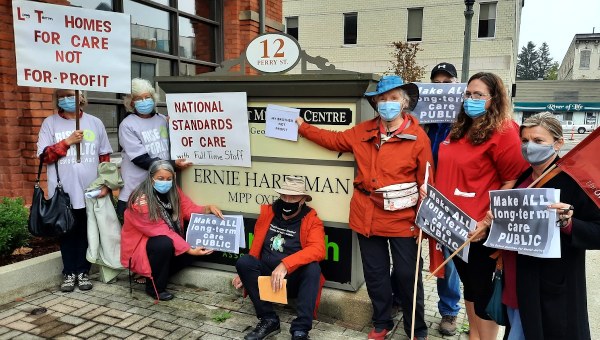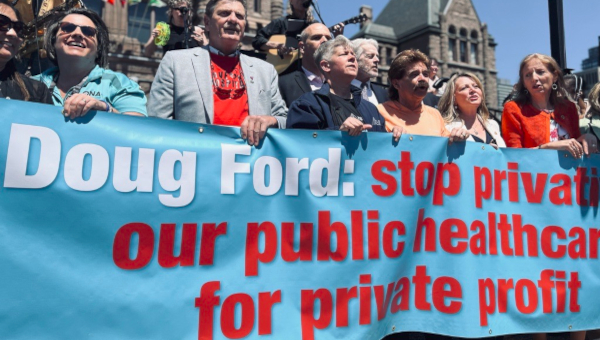Urgent Letter to Ontario MPPs Regarding the New Long-Term Care Act
Dear Members of Provincial Parliament,
We are writing to request that you do not support or facilitate any plan to drive through the “new” long-term care bill with undemocratic speed. We are asking that there be full public hearings across Ontario on this legislation.
Bill 37 Providing More Care, Protecting Seniors, and Building More Beds Act, 2021 is not truly a new long-term care act despite the reported statements of Minister Phillips preceding the bill’s introduction. The bill does, however, contain amendments to the existing act, some of which are consequential. In addition, the bill carries with it a significant opportunity cost: a lost opportunity to make meaningful changes in the public interest.
The most egregious change to the language of the legislation is in the preamble. The current LTC Homes Act commits the government to promoting public and non-profit long-term care only. The legislation is supposed to be interpreted in accordance with the commitments in the preamble. This matters. In the new bill, that clause is changed to include “mission driven” organizations – a term that is not defined in law and which, as you know, is a euphemism that been used to cover for an array of for-profit long-term care chains, including those that are responsible for the highest death rates and most ghastly conditions of living and care in our long-term care homes.

This proposed change is about facilitating the privatization of more long-term care homes. It is contrary to the morals and values of the vast majority of Ontarians but it suits the interests of the private equity, finance, and for-profit chain long-term care corporations. Given what has happened in our province’s experience with for-profit long-term care, their interests cannot again be allowed to supersede the public interest. This change should not have been put into the new legislation. At the very least it must be subject to fulsome debate and public input.
As noted, there is more that warrants a full public discussion, and since there was no proper public consultation prior to the introduction of the legislation, it must happen before this bill is driven through.
We must also note: we will not allow false excuses or manipulation to be used as cover for pushing through this legislation undemocratically. Many of the powers described as “new” in media statements are already covered in the existing Act and amendments. It is entirely within this government’s power to proclaim the sections of the Act passed by the Ontario Legislature in 2017respecting administrative penalties (fines) and suspensions of licenses and to begin to use them without delay. In fact, the government has been sitting on those powers for its entire term in office (3-years) without putting them into action. Further, there have always been powers to levy provincial offenses and fines upon conviction, and to suspend admissions and revoke licenses. In addition, the government could have passed a regulation through Cabinet – and can still forthwith – to institute a real enforceable minimum care standard (unlike the “target” proposed in the new law). Asking for real public consultation does not delay anything meaningful that could have already been done and can still be done right away in the interim.
As you know, successive governments have changed the rules of the Ontario Legislature to push through legislation more quickly. The most recent changes have resulted in some of the worst, most undemocratic railroading through of major healthcare legislation that we have seen in the entire 40-year existence of the Ontario Health Coalition. These practices have to end.
If almost 4,000 deaths in 16-months from COVID-19 alone in our long-term care homes is not enough to end partisanship and “business as usual,” what could possibly be enough? We are asking each of you to search your consciences. Tens of thousands of Ontarians have suffered hideously as a result of what has happened in our long-term care homes. Our province has among the worst pandemic outcomes in long-term care homes among developed nations. We need real change that is effective.
As you know, there are approximately 30,000 licensed long-term care beds with licenses that end in 2025. In addition, there are 15,000 new beds being licensed. This is a huge proportion of the capital stock of long-term care beds in our province. The public will be paying to build/rebuild and operate those homes for the next 30 years. Public debate about a major public policy issue, privatization of healthcare services and assets, and the use of billions of dollars in public money that will impact hundreds of thousands of Ontarians over the next 30 years cannot simply be sidelined. •
This article first published on the Ontario Health Coalition website.





